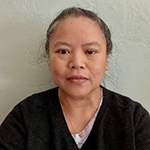Alam Ni Lola (Grandmother Knows)
There is violence in food: getting it, cooking it, eating it.
To crack open a coconut, hold it in one hand. Meet the scratch of the brown husk with your fingers like claws, arm outstretched. In the other hand, wield a machete. Aim its silver glint – its power recently renewed from the hiss of the sharpening stone – toward the coconut. Summon measured aggression. Strike. Drain the coconut water into a bowl.
Know where your food comes from. Remember that the chicken hanging upside down in front you was, moments ago, pecking at grains in our yard. Its throat slit, its blood draining into a cup, it is the same fertilized egg you warmed in your hand, the same chick whose feathers you fluffed and petted, the same one you will gather with your fingers, mixed with rice and sauced with vinegar, soy sauce, and garlic for your adobo dinner.
Rice grains plump and soften in steam, but it comes to our house hard. It arrives from across the bay to our front door in burlap sacks, maybe half a dozen at a time, harvested and packed by tenant farmers with calloused palms. When you open a sack, the grains inside are light brown, poky to the touch. What you want is inside the husk.
Drag a sack out to the street in front of our house on an eye-frying sunny day. Spread out the rough grains thinly. Let them dry, raking every so often over many hours like sand in a Zen garden. Coax the moisture off in the tropical humidity so you can then take sacks of it to the only mill in town that can break grain from husk. There is only foot traffic in this part of the village, so tires will not disturb many hours of this meditation.
There is only one oven in the whole village in the baker’s house, so there will be no chocolate chip cookies waiting after school at home. The baker’s oven has enough room only for the pan de sal, which the families who can afford them will buy for the next day’s breakfast.
If you want an after-school treat, the aratilis tree to the side of the house has many branches to climb. Hitch a basket onto your arm and pluck the blueberry-sized red fruits up above. Try not to eat all of them before getting down, even if their cotton candy taste temptation beckons. If you fall off while reaching for the reddest ripe fruit two branches up, the mud below will cushion your butt and limit your bruises. Scrape off the dirt and climb again.
Butter is such a luxury in the rural Philippines, there is not even a Tagalog word for it. There is only a noun that becomes an adjective to describe it: mantikilya. Used to suggest that it is like shortening, except for rich people. You can spread it on your pan de sal and sprinkle sugar on top, but only sparingly. Because butter is a few towns and a ride away, slow in a jeepney through a forested hillside, where rebel soldiers of the New People’s Army may or may not stop you, their rifles cocked to make your heart beat faster while the butter in your market sack begins to melt in the tropical heat.
The shock of food-filled shelves in a real grocery store in the next big town will overwhelm you that you will forget to buy something, like dried spices. You will have to rely on onions. Sibuyas with an “S” in Tagalog. They may come from your neighbors’ yard, but the word comes from cebollas with a “C,” among the many words the Spanish colonizers brought in the 1500s. As you slice sibuyas for your bistek, they will draw out tears from your eyes. Let them trace salty streaks down your face to remind you of the words and letters that erased the Sanskrit-like language and symbols your ancestors used to speak before the Spanish sailed over.
They captured more than 7,000 islands and claimed them after their ruler King Philip II. Indigenous culture was destroyed. And indigenous identity. By the time of the movement against Spanish rule, even the Katipunan, the brotherhood of revolutionaries, were led by men with Spanish names like Rizal and Bonifacio.
Violence is inherent in every day, in history. But forgiveness can be as close as reaching for the leche flan across the table, a sweetness to share.
Be grateful for your food, savor the poetry of flavor, and remember that survival comes from many sacrifices.

Shella Parcarey is a Filipino writer working on her first novel based on her childhood growing up in the Philippines under the Marcos dictatorship. Her poetry has been published in Black Fox Literary, and she is a former journalist published in The Wall Street Journal, Dow Jones Newswires, and the Arizona Daily Star. She is an Anaphora Arts Fellow, and her work has received support from Tin House Summer Workshop, VONA, and StoryBoard workshop at StoryStudio Chicago. She is an MFA student and Mapmakers Scholar at Pacific University. She graduated from Yale University, where she studied political science.

 BACK TO ISSUE
BACK TO ISSUE